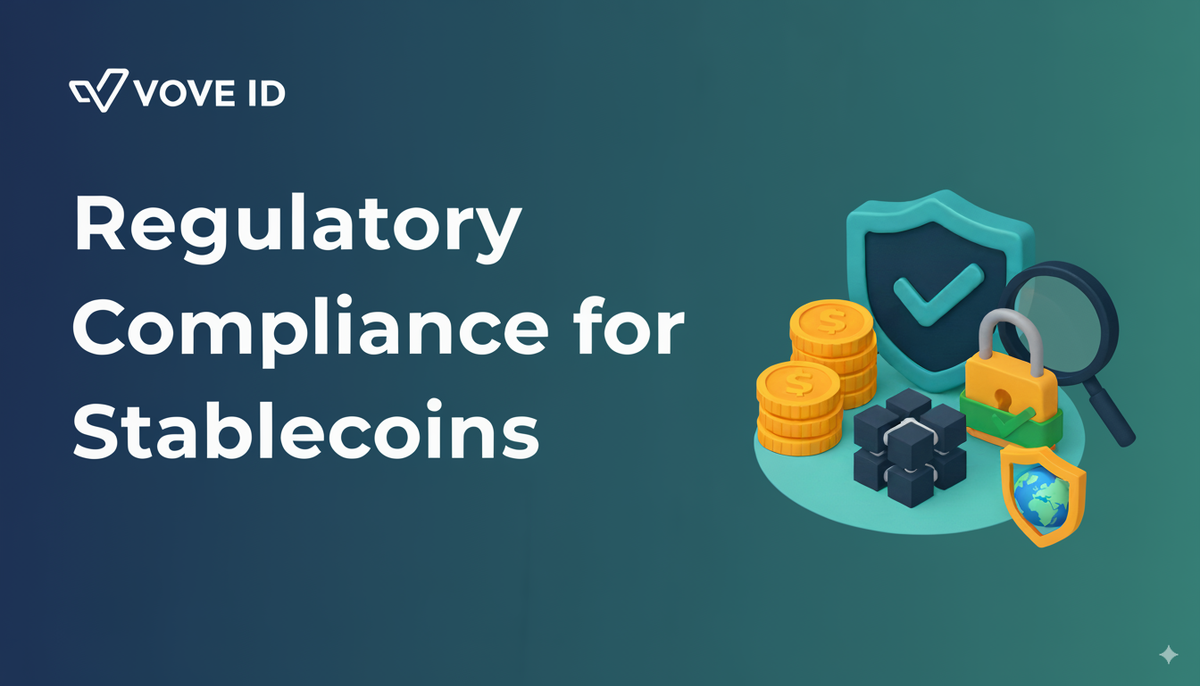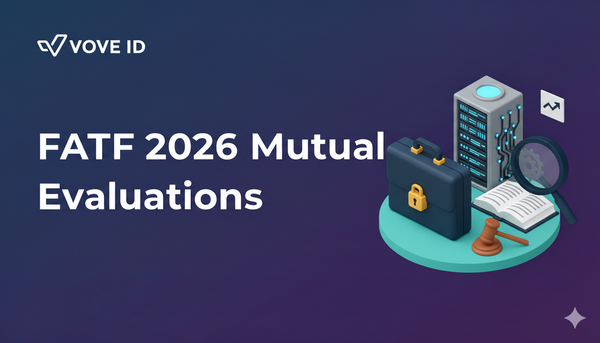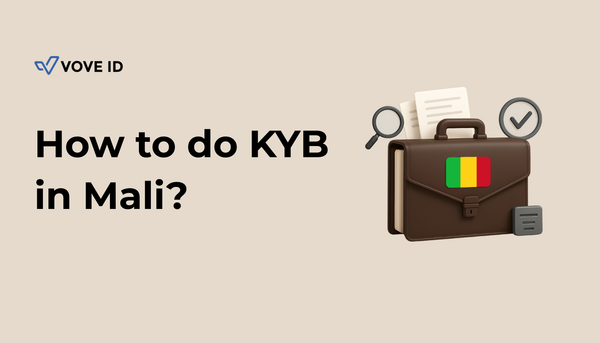KYC for Stablecoins: A 2025 Guide for Compliance and Growth
Explore stablecoin KYC compliance in 2025: regulatory frameworks, challenges, and solutions for fintechs in Africa, MENA, and beyond. Build trust and scale with robust eKYC strategies.

Stablecoins have evolved from niche digital tokens to a cornerstone of global payments and digital finance, facilitating billions in daily transactions. They power cross-border commerce, remittances, and decentralized applications, with a market capitalization reaching $251.7 billion in mid-2025, dominated by USDT at 68% ($112 billion). In regions like Africa and the Middle East, where traditional banking often falls short, stablecoins are bridging critical gaps. However, as adoption surges ($27 trillion in transactions in 2024, comparable to Visa and Mastercard volumes, according to Chainalysis and McKinsey, with USDT alone handling $1.14 trillion monthly) so do risks. Regulators globally are enforcing robust Know Your Customer (KYC) protocols to curb illicit activities, with the majority of crypto-related fraud in 2024 (around 60%) linked to stablecoins, per Chainalysis 2025 Crypto Crime Report. For startups and fintechs, KYC is not just a regulatory necessity but a strategic advantage, with solutions like VOVE ID enabling fast, secure eKYC to build trust and scale sustainably in this dynamic ecosystem.
This guide explores why KYC is critical for stablecoin businesses, the challenges they face, and actionable strategies to integrate compliance into growth plans, with a focus on emerging markets like Africa and MENA.
Why KYC Matters for Stablecoins
Unlike volatile cryptocurrencies, stablecoins maintain price stability by pegging to fiat currencies like the U.S. dollar, making them ideal for payroll, digital wallets, and cross-border payments. Their practicality, however, attracts illicit use - $4.2 billion in stablecoin transactions in 2024 were linked to money laundering, sanctions evasion, and other crimes, according to Chainalysis. Regulators are responding with stringent KYC requirements for issuers, exchanges, wallet providers, and payment apps to ensure transparency and security.
For businesses, KYC delivers:
- Trust and credibility: Verifying users builds confidence among customers and partners.
- Risk mitigation: Compliance reduces exposure to legal and financial penalties.
- Market access: Robust KYC enables partnerships with financial institutions and entry into regulated markets.
The Regulatory Landscape in 2025
Stablecoin regulation has matured rapidly. Key frameworks include:
- United States: The GENIUS Act, signed into law in July 2025, marks the first major U.S. crypto legislation, mandating strict KYC, customer due diligence (CDD), and 1:1 reserve backing for issuers.
- European Union: The MiCA framework enforces onboarding and risk checks for stablecoin providers, emphasizing CDD to prevent illicit activities.
- United Arab Emirates: The Payment Token Services Regulation, introduced in July 2024 by the Central Bank of the UAE, bans non-dirham-backed stablecoins like USDT and Binance USD for goods and services in onshore jurisdictions, aiming to curb potential abuses while promoting dirham-pegged tokens.
- Global Standards: FATF and the Financial Stability Board emphasize KYC and CDD for Virtual Asset Service Providers (VASPs), including stablecoin businesses.
In Africa and MENA, where local frameworks are still evolving, aligning with global standards and regional regulations like the UAE’s is critical for attracting international partners and investors.
Key KYC Challenges in the Stablecoin Ecosystem
Implementing effective KYC for stablecoins is complex due to unique challenges:
- Pseudonymity of blockchain transactions: Wallet addresses obscure real-world identities, necessitating robust onboarding and monitoring to link transactions to users.
- Cross-border complexity: Stablecoins operate across jurisdictions with conflicting KYC and CDD requirements, complicating compliance for global transactions.
- User experience: Lengthy or invasive KYC processes can deter users who value speed and simplicity, risking customer loss to competitors.
- Evolving regulations: Frameworks like GENIUS, MiCA, and the UAE’s Payment Token Services Regulation require constant adaptation to new due diligence and reporting standards.
- Resource constraints: Startups often lack the infrastructure or staff to build sophisticated KYC systems, increasing costs and risks.
- Privacy vs. compliance: Balancing user privacy with regulatory demands is challenging, especially given the decentralized ethos of blockchain.
These challenges are amplified by the scale of risks: in 2024, the majority of crypto-related fraud (around 60%) was linked to stablecoins, with $12.4 billion in crypto fraud, often exploiting weak KYC, per Chainalysis 2025 Crypto Crime Report.
Building an Effective KYC Program for Stablecoins
To address these challenges, businesses can adopt practical, scalable solutions:
- Risk-Based Approach
Tailor KYC intensity to risk levels—light checks for low-value transactions and rigorous verification for high-risk activities. This optimizes resources while ensuring compliance. - Digital Identity Verification (eKYC)
Leverage biometrics, government ID checks, and real-time data validation for fast, secure onboarding. Solutions like VOVE ID streamline eKYC, enabling compliance without compromising user experience. - Continuous Monitoring
Use AI and machine learning for ongoing analysis of user behavior and transaction patterns, reducing false positives by up to 40% and detecting anomalies in real time. - Integrated Compliance Workflows
Embed KYC into broader processes like risk assessment and regulatory reporting to ensure audit-readiness and accountability. - Scalability and Automation
Automate KYC with AI-driven tools that analyze millions of transactions per second, integrating blockchain analytics to flag suspicious activity. - Compliance by Design
Build platforms with embedded KYC, using innovations like zero-knowledge proofs and verified credentials to balance privacy and regulatory needs.
These strategies enable businesses to meet global standards like FATF and regional regulations while scaling efficiently.
KYC as a Competitive Advantage
In emerging markets, where access to traditional finance is limited, stablecoins paired with robust KYC offer a secure, inclusive alternative. In Nigeria, stablecoins drive $22 billion in business-to-business payments. In the Gulf, they enable faster, cheaper remittances, with the UAE receiving $30 billion in digital assets by mid-2024, 52% in stablecoins. Strong KYC builds trust with regulators, investors, and users, positioning businesses for growth.
Solutions like VOVE ID empower startups in Africa and MENA to adopt international-grade eKYC without building large in-house teams, freeing resources for innovation.
Regional Relevance: Africa and MENA
Stablecoins address critical needs in Africa and MENA, where digital identity verification in Africa is increasingly vital:
- Nigeria: Stablecoins account for 43% of crypto transactions in Sub-Saharan Africa, supporting B2B payments.
- Gulf Countries: Migrant workers rely on stablecoins for low-cost remittances, with the UAE’s regulatory framework ensuring compliance.
- East Africa: Digital wallets are mainstream, making stablecoins a natural fit.
Proactive KYC ensures compliance with emerging local regulations, such as the UAE’s Payment Token Services Regulation, and global standards, enabling businesses to scale confidently.
Future of KYC in Stablecoins
The future lies in "compliance by design," embedding KYC into platforms from the start. Innovations like zero-knowledge proofs and decentralized identity systems will balance privacy and regulatory demands. Partnerships with providers like VOVE ID will become standard, as regulators and users demand greater trust. With stablecoin transactions projected to grow beyond $27 trillion in 2025, robust KYC is essential for sustainable growth.
Conclusion
Stablecoins are transforming payments in 2025, but their potential hinges on effective KYC. By adopting risk-based approaches, leveraging eKYC, automating processes, and embedding compliance, businesses can navigate regulatory complexities while delivering seamless user experiences. For startups in Africa, MENA, and beyond, KYC is not a burden but a catalyst for trust, scale, and long-term success in the dynamic stablecoin ecosystem.
Ready to scale your stablecoin business with confidence?
Start your seamless eKYC journey with VOVE ID today and stay compliant while growing across Africa and MENA.




